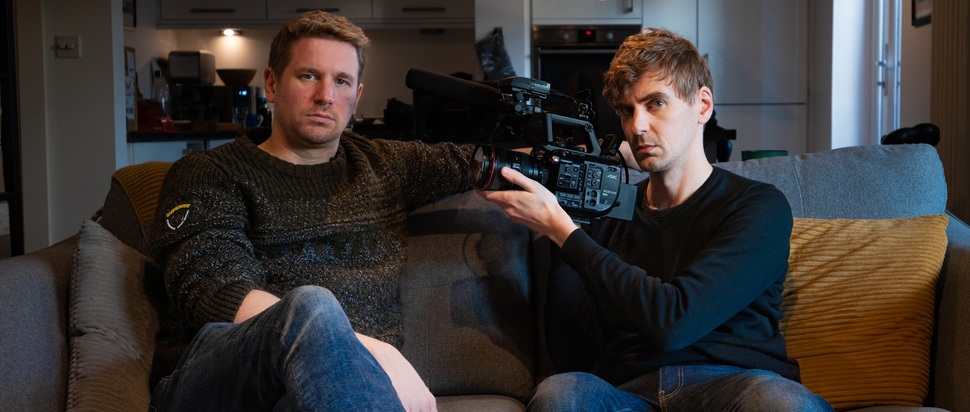Manly Tears: Duncan Cowles on Silent Men
Ahead of his debut feature Silent Men, documentarian Duncan Cowles talks to us about getting blokes to open up on camera, the archivist impulse to capture memories and crying as a cure
“I am neither silent nor a man.” That's the first thing I tell Duncan Cowles when we meet over Zoom to discuss his new documentary, Silent Men. But then the men in his film – from his own family and friends to ones he meets down the pub and through online ads – are not silent either. In fact, they’re all extremely chatty.
“Yeah,” agrees Cowles. “I found that most people I spoke to were actually really willing and ready to speak when I started making it. There wasn't a shortage of people wanting to appear.”
Silent Men is Cowles’ first feature, following a slew of BAFTA-winning shorts as well as a TV series for BBC Scotland where he interviewed millennials about topics like moving back home and getting sober. His knack for diving into tricky subjects makes him the perfect person to put you at ease when tackling his most difficult topic yet: the alarming state of men’s mental health, in large part thanks to a culture where expressing emotions for men is anathema.
The stats are alarming. Despite our growing understanding of the subject, suicide rates have been at their highest since 1999, and men aged 45 to 64 have the highest suicide rate (22.4 per 100,000). “You know, I'd been aware that blokes were a bit useless in expressing emotion, and I knew that I was bad at it,” Cowles tells me. “But it was the stats that really frightened me quite a lot, and then I realised how many friends had struggled with it. That motivated me to prevent myself from getting worse, because I could see all of us getting a bit worse.”
Cowles began filmmaking at Edinburgh College of Art, and his docs make for unique viewing. “I don’t make the type of polished non-fiction films you see on Netflix,” he says. “There are lots of mistakes left in.” But it’s these “mistakes” that make his work feel accessible and human. Silent Men invites you on a journey with the filmmaker, seeing up close and personal the changes in his mental and emotional health, which took place over seven years. Was the film planned to, well… take so damn long to make?
“I was challenged by the film,” he says of the process. “There were points of thinking, ‘I don't know if I'm going to actually be able to do this,’ because I was aware I was going to have to put much more of my own personal situation on screen and actually do something different on camera, to show some kind of visible progress. Otherwise it wasn't going to work. And I just wasn't ready to do it. I was too scared for quite a while.”
On the surface, the stakes of telling your loved ones what they really mean to you may seem low, compared to say, a high-octane action film, but it can feel like life or death if you’ve never been encouraged to do it before (that Margaret Atwood line about men’s worst fear is being laughed at springs to mind). In the film, Cowles visibly squirms onscreen while telling his mum and dad how he feels about them.
Cowles isn't the only one put through the wringer in Silent Men. There’s also his mate Ainsley. What strikes me is how shocking it is to see a grown man cry on screen. Women’s tears are a genre unto themselves. We watch, through Cowles, a private video sent to him by Ainsley, showing an artistic rendering of a crying session/ritual set to Martha Wainwright’s Factory. "[Ainsley] was sort of embarrassed even when we showed him it, asking if we still loved him…” recalls Cowles. “Watching films is probably my way of purging emotional buildup. I'm always amazed how ready the tears are. It's slightly euphoric. Like when you're sick… there's points of pure ecstasy lying by the toilet vomiting.”
Cowles’ pain has been our pleasure, in that his vulnerability has paved a way for others. “A guy came up to me after the screening at Sheffield DocFest and was like, ‘I've never told my dad that I love him before, but I'm gonna go and do it,’” Cowles recalls. “And he goes outside – I saw him, on his phone, doing it – and then he came back in with a big smile on his face, and said, ‘I did it!’
”It impacted him so much that he did that straight after the screening. That's such a nice feeling, to feel like you've taken your own situation, which feels quite isolated, and making a film like this, where it's quite often a bit of a lonely journey, and then having it go out and impact other people's lives.”
Regardless of the impact – which will undoubtedly spark more conversations around men’s mental health – it’s also a beautiful capsule of Cowles’ own family; something to hold on to. “It's like a protest against the passing of time and things changing,” says Cowles. “That's what filming is for me.” And the effects of his film have surpassed the making of it: “My dad won’t let me leave the room without a hug now,” he says with a smile.
Silent Men is released 19 Nov by Cosmic Cat
